#robot series
Text
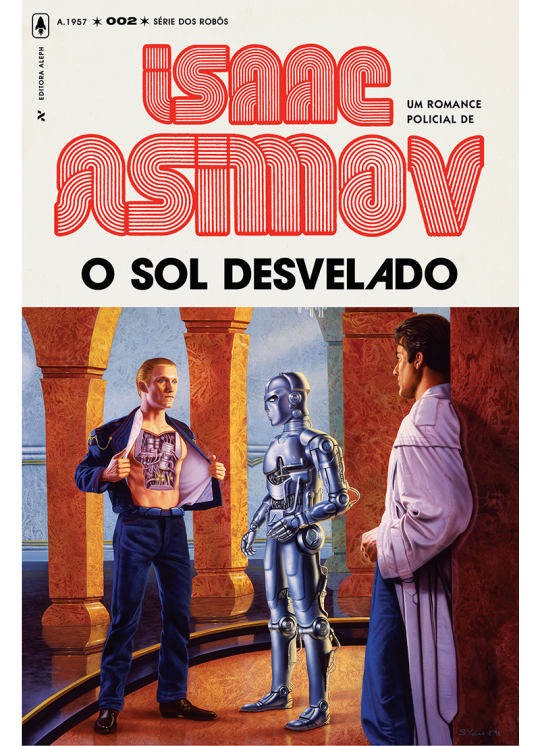
Covers that make you wonder if it's gay erotica or science fiction... Can't wait to read this one.
#robot series#the naked sun#i think that's the original name#isaac asimov#elijah baley#daneel olivaw
46 notes
·
View notes
Text
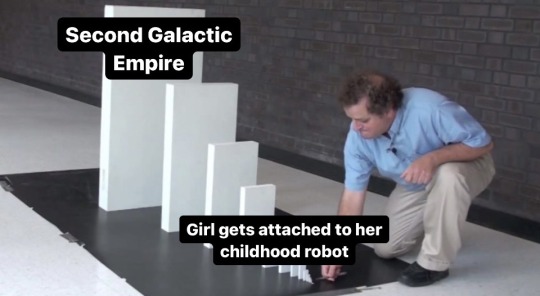
#isaac asimov#foundation#robot series#small domino is a reference to vasilia. also maybe Robbie and Andrew martin iykyk
39 notes
·
View notes
Text

C/Fe
44 notes
·
View notes
Text
do you ever think about how Daneel had to investigate the murder of his lookalike. twice.

#isaac asimov#asimov#robot series#somebody help him!!! hes like 3 years old!!!#also jander is the long hair boi and sarton has short hair
18 notes
·
View notes
Text
finished caves of steel. i wanna study elijah baley under a microscope n find out what possesses him 2 go all ace attorney over things he has no ACTUAL knowledge abt AT ALL n then proceed 2 embarrass himself for being a stupid prick, in every situation he possibly can
44 notes
·
View notes
Text
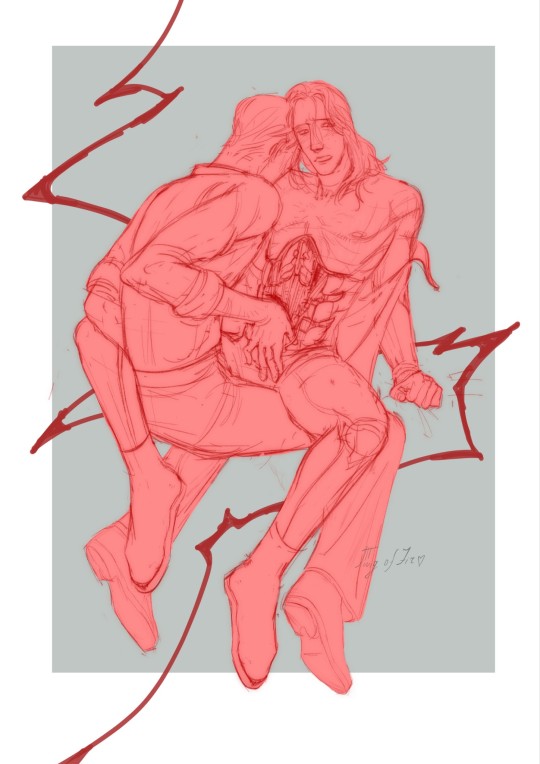
Research ❤️
15 notes
·
View notes
Text
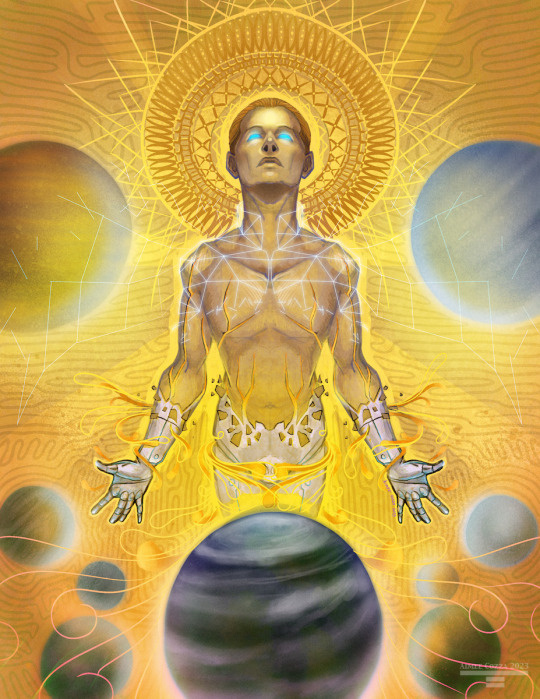
Welp, Daneel's done.
I also made a variant. I kinda like the variant better but everyone else liked this one more.
#r. daneel olivaw#daneel olivaw#isaac asimov#humaniform#robot#robotics#fanart#my art#digital art#illustration#foundation#robot series#r daneel olivaw
77 notes
·
View notes
Text

R. Daneel Olivaw & Elijah Baley (The Robots of Dawn)
Shitposts under the cut

That's how it went right

Everything's for free, the Aurorans provided it after they fumigated him
#asimov#the robots of dawn#c/fe#elijah baley#r daneel olivaw#daneel olivaw#robot series#isaac asimov#robots#I'll be taking no criticism at this time#my art#digital art#artists on tumblr#art
52 notes
·
View notes
Text
17 notes
·
View notes
Text

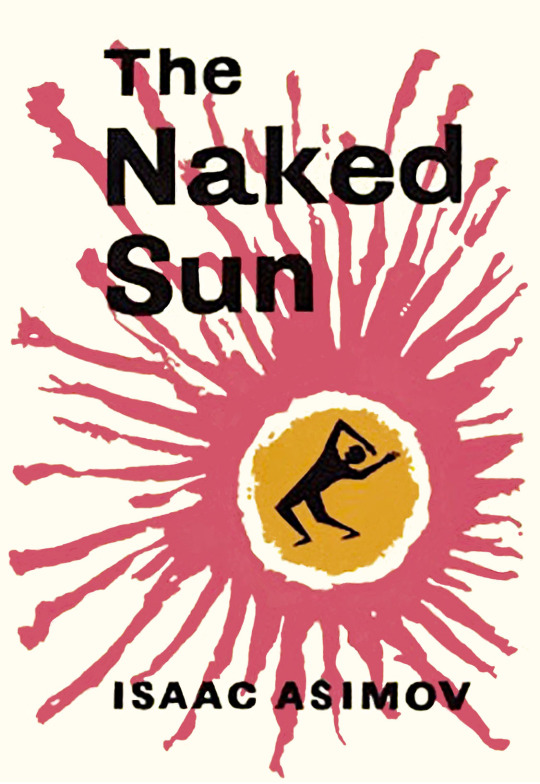
THE NAKED SUN by Isaac Asimov (New York: Doubleday, 1957) Cover art by Ruth Ray. // (London: Michael Joseph, 1958) Dust wrapper by Kenneth Farnwell.
Sequel to THE CAVES OF STEEL. Science fiction mystery.
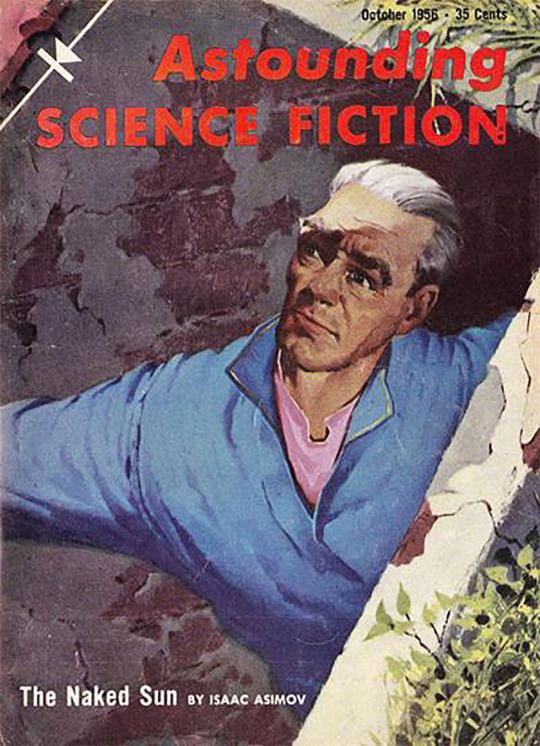
Astounding Science Fiction, October 1956. Edited by John W. Campbell. Cover by H.R. Van Dongen.
THE NAKED SUN [Part 1 of 3; Elijah (Lije) Baley; Robots] by Isaac Asimov. Illustrated by H.R. Van Dongen. [Part 1 of 3]
“What They’re Up Against” by John Hunton. llustrated by Frank Kelly Freas
“Death March by Algis Budrys. Illustrated by H.R. Van Dongen
“Sound Decision” by Randall Garrett & Robert Silverberg. Illustrated by H.R. Van Dongen
“Ceramic Incident” by Theodore L. Thomas. Illustrated by Frank Kelly Freas

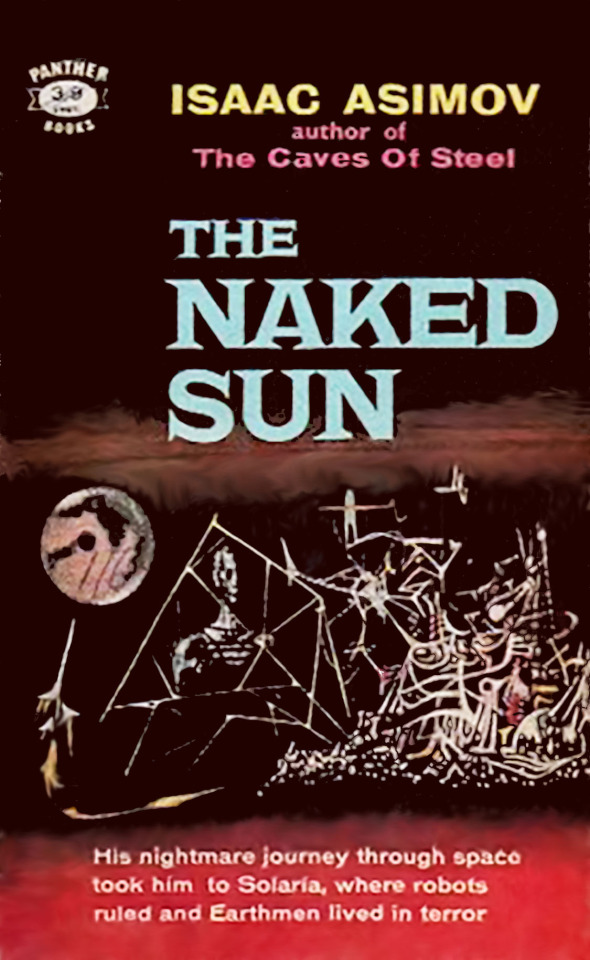
(New York: Bantam, 1958) Cover by Richard Powers. //(London: Corgi, 1960) Cover design by Richard Powers.
#book blog#books#books books books#book cover#science fiction#pulp art#ruth ray#isaac asimov#robot series#3 laws of robotics#elijah bailey#lije baily#richard powers#h.r. van dongen#frank kelly freas#kenneth farnwell
8 notes
·
View notes
Text
Hari Seldon and Lady Gladia, in the afterlife, on their way to meet Susan Calvin and tell her what they did with robots:
youtube
#isaac asimov#robot series#foundation series#susan calvin#hari seldon#gladia delmarre#lady gladia#Youtube
13 notes
·
View notes
Text
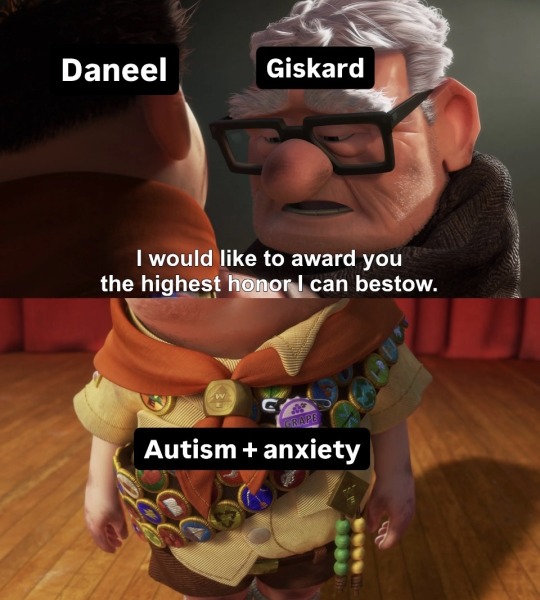
The end of robots and empire be like
14 notes
·
View notes
Text
Ok, I was wondering if I should watch the Foundation tv show and I find out they gender flipped that character
Fair enough, but... why him???
I am all for updating the work and adding diversity, including gender flipping and giving existing characters more diverse racial backgrounds, but of all the characters that could have been women, did they have to to pick the one who had the most compelling mlm homoerotic backstory?
I know I say this as someone who DNF'd the first Foundation novel, but I adore Asimov's Robot Series, and I know full well who Eto Demerzel is supposed to be.
Fine, fine, I know, major character in the grand scheme of things, yay for us ladies, but... but... I was so hoping his adaptation evolution would be to make him explicitly gay 😔
Also, why do studios keep doing this? Erasing another minority (either canon or subtextual) by casting white women in those roles? Like "look, I'm progressive, I cast this blond woman in a role that used to be male - never mind that the male in question belonged or should belong to a different minority" (hello, Tilda Swinton in Doctor Strange).
26 notes
·
View notes
Text

Like to join the polycule reblog to join the polycule
#isaac asimov#foundation#robot series#pinning this bc it’s my thesis statement on the characters lol
16 notes
·
View notes
Text
On Elijah Baley and Daneel Olivaw’s romantic relationship
Resposting this post from my previous tumblr account, several years ago, because I just discovered there’s a new C/Fe fandom on tumblr. :)
In which I defend the theory that all the C/Fe subtext was intentional, and Asimov wrote them as an actual couple. For that, it is not enough to look just at the text. We have to take a look at Asimov’s way of thinking, so let’s get to it.
I haven’t read Yours, Isaac Asimov (a collection of his letters), but apparently there’s something in there about him considering homosexuality “a moral right” (full disclosure: my source for that is Wikipedia. If I ever find the book, I’ll edit this post if I think it’s necessary). However, I have (thanks to a post here on tumblr) read Asimov’s Guide to Shakespeare, a most interesting book that shows that Asimov was perfectly aware of the existence of homosexual subtext, and of how that subtext works. For reference, it was published in 1970, after Caves of Steel and The Naked Sun, and before the rest of the series.
Let me share some quotes from this book:
“The sadness is never explicitly explained in the play and it may be accepted as simply setting a mood. Antonio, after all, is to spend much of the play in a position of great danger.
However, it is possible to speculate that there is a more specific cause of sadness, one which Shakespeare does not care to elaborate upon. As will appear soon enough, Antonio has a male friend to whom he is devoted with a self-sacrificial intensity that is almost unbelievable. This friend, we are soon to find out, is about to woo a young lady in the hope of marrying her. Antonio may very easily be meant by Shakespeare to represent the nobility of homosexual love, something he hints at in several plays (as, for instance, in The Two Gentlemen of Verona, see page I-473) without quite daring to be specific about it.
Well then, if Antonio’s friend has, in the eagerness of his new plans involving a lady, grown more distant, is not this reason enough for the poor man to be sad—and yet be unable to explain it, without disgrace, to his friends?”
Relevant from this quote: Asimov’s sympathy and pity towards Antonio’s unrequited love (he later mentions Antonio’s feelings for Bassanio twice more, leaving no doubt as to his interpretation of it: “It is Bassanio with whom Antonio is in love and the strength of the latter’s affection is quickly shown”, and “Surely the attachment on Antonio’s side can only be love in its fullest sense. Yet it may be one-sided. Bassanio’s affection may be nothing more than friendship, for he seems to have no hesitation in attempting to draw on Antonio’s support for a competing love”), which shows he didn’t have any problems with non-straight characters, and this sentence: “Antonio has a male friend to whom he is devoted with a self-sacrificial intensity that is almost unbelievable”.
Compare it to another quote from this book:
“In addition, there are a number of events in Shakespeare’s plays that can be interpreted from a homosexual point of view, yet which Shakespeare presents most sympathetically. There are the close male friendships, even to threatened death(…)”
I don’t think being willing to sacrifice oneself for a friend implies having romantic feelings for them. But it seems Asimov did. He used it twice as evidence for Antonio being in love with Bassanio.
And you all know what I’m going to quote now.
“Baley felt abashed. He said, “You do not resent the situation in which you may be forced to give up your existence for me?”
“It is in my programming, Partner Elijah,” said Daneel in a voice that seemed to soften, “yet somehow it seems to me that, even were it not for my programming, saving you makes the loss of my own existence seem quite trivial in comparison.”
Baley could not resist this. He held out his hand and closed it on Daneel’s with a fierce grip. “Thank you, Partner Daneel, but please do not allow it to happen. I do not wish the loss of your existence. The preservation of my own would be inadequate compensation, it seems to me.”
And Baley was amazed to discover that he really meant it. He was faintly horrified to realize that he would be ready to risk his life for a robot. — No, not for a robot. For Daneel.”
Considering Asimov’s ideas about close male friendships in which one is willing to sacrifice himself for the other… Take your own conclusions.
One more quote, and I promise I am done with the Shakespeare:
“Nevertheless, there are a number of cases in the romances in which friendship between males is suspiciously close and in which the language used between them is suspiciously ardent”
… Define “suspiciously ardent”. Would “do not, for your own sake, test the force of our love” qualify? What about “I cannot say what I feel in any human sense, Partner Elijah. I can say, however, that the sight of you seems to make my thoughts flow more easily, and the gravitational pull on my body seems to assault my senses with lesser insistence”? “Baley hoped earnestly that the creature’s unreadable eyes could not penetrate Baley’s mind and see that wild moment, just past and not yet entirely subsided, when all of Baley had concentrated into a feeling of intense friendship that was almost love.” ? “He felt Daneel’s steady arm about his waist and shame prevented him from doing what, at the moment, he most wanted to do- to turn and hide his face against the robotic chest. He might have been unable to resist if Daneel had been human”? Or what about an ardent quote from a third part? Like, I don’t know, Gladia’s “Must I tell you this? Don’t you already know it? Here is the robot that Elijah Baley loved. Yes, loved. I wanted to see Elijah before he died, to say good-bye to him; but he wanted Daneel” ?
I could go on, but I think the point is made. Asimov understood subtext far too well to write all those quotes accidentally. It can’t not have been intentional.
And since we are talking about language, there’s something else I want to point out: Asimov didn’t care at all about continuity, right? He’s been known to forget as many as three large plot points from a previous novel when writing the sequel (Robots and Empire features Amadiro complaining about Daneel’s and Jander’s looks as if they were a fantasy, and not made in the image of an actual man, and Daneel never having seen a dead human and Gladia never having fainted, both things that not only happened, but were vital to the conclusion of The Naked Sun).
So I’ll repeat that quote about Daneel and Elijah being willing to sacrifice themselves for each other, and put another quote next to it for comparison.
“Baley felt abashed. He said, “You do not resent the situation in which you may be forced to give up your existence for me?”
“It is in my programming, Partner Elijah,” said Daneel in a voice that seemed to soften, “yet somehow it seems to me that, even were it not for my programming, saving you makes the loss of my own existence seem quite trivial in comparison."”
And the other quote:
"Dors said softly, ‘Hari, I want what is good for you because of what I am, but I feel that if I wasn’t what I am, I would still want what is good for you.’”
In Prelude to Foundation that’s as close as Dors gets to confessing her love for Hari before they kiss (and proceed to get married, adopt a child, and live happily until death does them part). Look at it, it’s the same conversation. It’s a robot telling a human how much they care for them, in a way that they feel is not connected to the First Law, and that they believe they would still feel that way if they hadn’t been programmed with it.
More than that, it’s the same language. Both robots’ voices are soft, and their sentences are structured in the same way (“I care for you because I am a robot, but I feel that if I weren’t one I would still care for you”). I don’t know when these scenes were written, but the books were published five years apart from one another. That’s an eternity in “continuity doesn’t matter” land. So there are two options: either Asimov actually went through the trouble to go back to Robots of Dawn to check Daneel’s dialogue and sort of copy it, or (honestly, much more likely) he forgot about Daneel and Elijah’s scene completely, but when he was writing about Dors, essentially Daneel’s daughter, who is a lot like him in several aspects, confessing her love for a human who has a lot in common with Elijah, he subconsciously repeated the pattern without even noticing. Which would still mean he considered that particular argument to be romantic, and would not have used it with Elijah and Daneel if he didn’t see them as a couple. Oh, and it would also mean that he remembered that scene in some level, even when he didn’t remember major plot points.
Another point that is worth noticing is that there’s a definite increase in C/Fe moments, and in the intensity (ardor? xD) of those, from Robots of Dawn forwards. It actually gets a bit strange when you are binge reading the whole series in order.
But the explanation, of course, is that Robots of Dawn was published decades after The Naked Sun, so some changes in style are to be expected. I just don’t know if the reason for this particular change was a conscious decision of Asimov to make them more definitively a couple (maybe to provide Daneel with a reason to do the things that led to the merging of the series with the Foundation verse. I have no basis for this, it’s just speculation), or if it just means that subtext could get bolder in the 1980s than it could in the 1950s. If so, I can’t help imagining what might happen between Daneel and Elijah if Asimov could write about them today. I really do think there’d be at least one kiss.
These have been my C/Fe rambles for this night.
#Elijah Baley#Daneel Olivaw#C/Fe#Robot Series#Hi everyone. I'm from the old tumblr fandom#Happy to make your acquaintance#I'm also in talks to speak about this ship on a podcast and I'm really excited.#I'll let you know when it happens
99 notes
·
View notes
Text
...and why are they misspelling Elijah Baley's surname randomly in the robot series.......?
4 notes
·
View notes